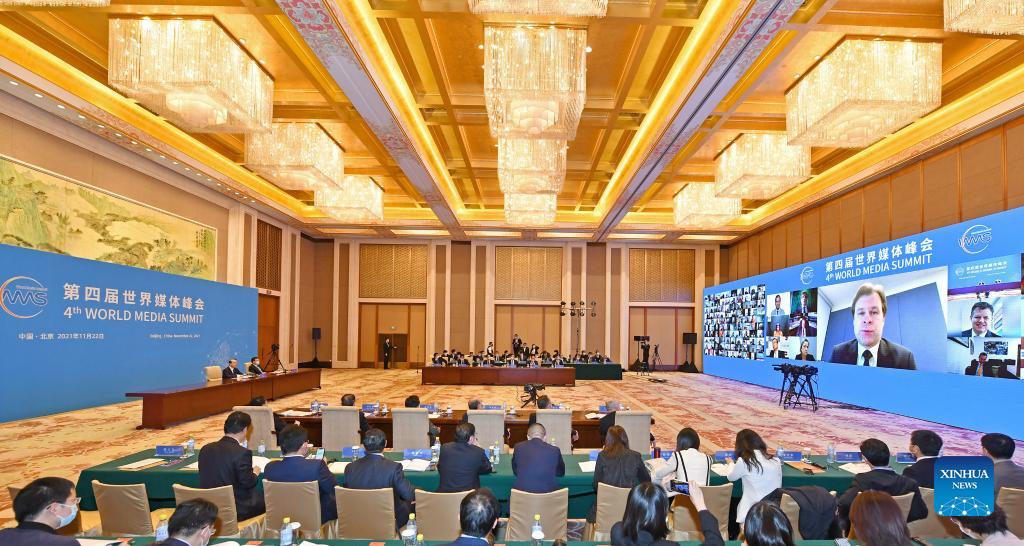World media leaders discuss challenges, opportunities in pandemic world
 The fourth World Media Summit opens in Beijing, capital of China, Nov. 22, 2021. (Xinhua/Li Xin)
The fourth World Media Summit opens in Beijing, capital of China, Nov. 22, 2021. (Xinhua/Li Xin)
Leaders and representatives from more than 260 media outlets and institutions across the world on Nov. 22 gathered in person or online at a media summit to discuss challenges and opportunities brought by COVID-19 and how they could cooperate to cope with new media trends shaped by the pandemic.
The fourth World Media Summit (WMS), hosted by China's Xinhua News Agency, focused on the theme of "Media Growth Strategy under the Impact of COVID-19."
The participants recognized the pandemic's impacts on the media industry and discussed the media's responsibilities in fighting COVID-19.
"The pandemic endangers the health of mankind, and the media have a mission to fulfill," said He Ping, executive president of the WMS and president of Xinhua.
He called on world media to fully reflect the consensus and actions of all countries to jointly fight the COVID-19 pandemic, tell the anti-pandemic stories well, spread positive information, reflect ordinary people's feats, and tell the glory of human nature.
As a bridge linking people's hearts and a driving force for social development and progress, the global media should join hands to undertake the missions in promoting solidarity amid the global fight against the pandemic, and play a positive role in advocating the common values of humanity and advancing the building of a community with a shared future for humanity, He Ping said.
Stressing the importance of solid interviews in spite of the challenges brought to face-to-face communication by the virus, Toru Mizutani, president and editor-in-chief of Kyodo News, said media workers must talk to their sources to make sure they have authentic information.
Despite the arduous challenges, the pandemic also brought new opportunities, compelling media organizations to make innovation and embrace transformation, attendees to the summit said.
Luis Enrique Gonzalez Acosta, president of Prensa Latina, said the pandemic has driven home the need to embrace media integration, and the media must innovate to open more channels to spread news.
Promoting media cooperation has been a key theme of the WMS since its inception in 2009.
Covering more than 260 media outlets and institutions from nearly 100 countries and regions, the WMS mechanism is a high-end communication and coordination platform for global media.
"From Beijing to Moscow, from Doha to Beijing, the summit has brought us together, with cooperation and exchanges yielding fruitful results," He Ping said.
For the WMS's development, He proposed jointly promoting exchanges and cooperation with a more open-minded approach, seeking innovation and development with a more enterprising spirit, and adopting more pragmatic measures to jointly build mechanisms and platforms.
The summit also announced awards for its winter sports photo contest. A total of 21 photos (photo series), out of 2,740 entries submitted by 870 photographers from 65 countries and regions, were awarded.
At the summit, many attendees shared their experience in covering the Tokyo Olympics and voiced their expectations of the Beijing 2022 Olympic Winter Games and Paralympic Winter Games.
The summit has enhanced understanding and deepened friendships, and will advance media cooperation on a global scale to meet challenges, achieve win-win development, and enhance bonds among countries, according to a joint statement of the summit.
The statement also noted that the event will pool a powerful force for building a community with a shared future for humanity and a better world.
"As long as we keep in mind the social responsibility of the media, answer the questions of our times correctly, build up broad consensus worldwide, and make concerted efforts, we will be able to inject confidence and fighting spirit into the global combat against COVID-19, and contribute to the common development of media," He Ping noted in his remarks.